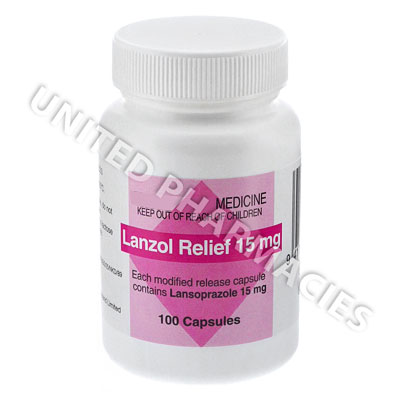Customers also like
Nexpro (Esomeprazole Magnesium) - 40mg (15 Tablets)
our best price : $8.02
Solox (Lansoprazole) - 30mg (28 Capsules)
our best price : $12.18
Pantoprazole (Pantoprazole Sodium Sesquihydrate) - 20mg (28 Tablets)
our best price : $9.87
Omezol Relief (Omeprazole) - 10mg (90 Capsules)
our best price : $10.19
Ranitidine Relief (Ranitidine Hydrochloride) - 300mg (500 Tablets)
our best price : $130.10
Description
Lanzol (Lansoprazole) is used to promote healing in patients with reflux oesophagitis, or to treat duodenal and gastric ulcers. Its therapeutic benefits are achieved by means of inhibiting the secretion of stomach acid. Lansoprazole is referred to as a substituted benzimidazole and it belongs to a class of medicines called proton pump inhibitors. Its antisecretory effects are produced by suppressing an enzyme system that occurs within the parietal cells of the stomach.
This enzyme system functions as the proton pump, and plays a key role in the production and release of stomach acid. Therefore, by blocking it, this medicine can cause a significant decrease in the output of stomach acid, which helps to treat the conditions listed above. Patients whose symptoms cannot be effectively treated with histamine receptor antagonists may sometimes be told to use this medicine by their doctor.
Lanzol (Lansoprazole) is provided in capsule form, each of which contains 15mg or 30mg of the active ingredient. Swallow the capsule alongside a glass of water, however, it must not be bitten or chewed. Gastric ulcers or other disorders may need to be treated with a different dosage schedule or for a longer period of time. Ensure that you follow the orders of your doctor at all times.
Some side effects which have been reported by patients undergoing treatment with Lanzol (Lansoprazole) include:
- Vertigo
- Itchy sensation
- Aches in the joints
- Thinning of the hair
- Constipation or loose stools
Ensure that your doctor is made aware of all reactions which occur. Attend the hospital straight away or see your doctor if you experience itchy blisters, visual disturbances, enlarged breasts or any other serious side effects that have not been listed here.
As Lanzol (Lansoprazole) reduces stomach acid, the risk of stomach infections could possibly be increased. This is because stomach acid is able to destroy harmful bacteria. Should you be affected by severe diarrhoea or vomiting, see your doctor straight away.
Dietary advice may be provided by your doctor. This could include drinking less beverages that have caffeine in them and consuming smaller but more frequent meals.
Seek immediate emergency medical attention if you suffer an allergic reaction. Symptoms to watch for, which may be indicative of a reaction, include skin rashes, hives, swelling of the face or limbs, trouble breathing, and trouble swallowing.













